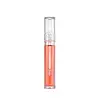What's inside
What's inside
 Key Ingredients
Key Ingredients

 Benefits
Benefits

 Concerns
Concerns

 Ingredients Side-by-side
Ingredients Side-by-side

Hydrogenated Polyisobutene
EmollientDiisostearyl Malate
EmollientOctyldodecanol
EmollientCaprylic/Capric Triglyceride
MaskingEthylhexyl Hydroxystearate
EmollientMenthyl Lactate
MaskingSilica Dimethyl Silylate
Emollient1,2-Hexanediol
Skin ConditioningDextrin Palmitate
EmulsifyingDibutyl Lauroyl Glutamide
Skin ConditioningDibutyl Ethylhexanoyl Glutamide
Skin ConditioningParfum
MaskingCalcium Sodium Borosilicate
CI 77891
Cosmetic ColorantTin Oxide
AbrasiveAnemarrhena Asphodeloides Root Extract
Skin ConditioningPrunus Amygdalus Dulcis Oil
Skin ConditioningHydrogenated Polyisobutene, Diisostearyl Malate, Octyldodecanol, Caprylic/Capric Triglyceride, Ethylhexyl Hydroxystearate, Menthyl Lactate, Silica Dimethyl Silylate, 1,2-Hexanediol, Dextrin Palmitate, Dibutyl Lauroyl Glutamide, Dibutyl Ethylhexanoyl Glutamide, Parfum, Calcium Sodium Borosilicate, CI 77891, Tin Oxide, Anemarrhena Asphodeloides Root Extract, Prunus Amygdalus Dulcis Oil
Diisostearyl Malate
EmollientBis-Behenyl/Isostearyl/Phytosteryl Dimer Dilinoleyl Dimer Dilinoleate
EmollientPolyglyceryl-2 Triisostearate
EmulsifyingBis-Diglyceryl Polyacyladipate-2
EmollientParaffin
PerfumingTridecyl Trimellitate
EmollientPentaerythrityl Tetraisostearate
EmollientMicrocrystalline Wax
Emulsion StabilisingSorbitan Isostearate
Emulsifying1,2-Hexanediol
Skin ConditioningDisteardimonium Hectorite
StabilisingSynthetic Wax
AbrasiveCI 77891
Cosmetic ColorantEthylene/Propylene Copolymer
AbrasiveCI 45410
Cosmetic ColorantCI 15985
Cosmetic ColorantPropylene Carbonate
SolventCI 15850
Cosmetic ColorantParfum
MaskingLimonene
PerfumingLinalool
PerfumingSimmondsia Chinensis Seed Oil
EmollientPrunus Amygdalus Dulcis Oil
Skin ConditioningPrunus Armeniaca Kernel Oil
MaskingOenothera Biennis Oil
EmollientOlea Europaea Fruit Oil
MaskingArgania Spinosa Kernel Oil
EmollientButyrospermum Parkii Butter
Skin ConditioningCamellia Japonica Seed Oil
EmollientCaprylic/Capric Triglyceride
MaskingMangifera Indica Fruit Extract
Skin ConditioningRosa Canina Fruit Extract
AstringentDiisostearyl Malate, Bis-Behenyl/Isostearyl/Phytosteryl Dimer Dilinoleyl Dimer Dilinoleate, Polyglyceryl-2 Triisostearate, Bis-Diglyceryl Polyacyladipate-2, Paraffin, Tridecyl Trimellitate, Pentaerythrityl Tetraisostearate, Microcrystalline Wax, Sorbitan Isostearate, 1,2-Hexanediol, Disteardimonium Hectorite, Synthetic Wax, CI 77891, Ethylene/Propylene Copolymer, CI 45410, CI 15985, Propylene Carbonate, CI 15850, Parfum, Limonene, Linalool, Simmondsia Chinensis Seed Oil, Prunus Amygdalus Dulcis Oil, Prunus Armeniaca Kernel Oil, Oenothera Biennis Oil, Olea Europaea Fruit Oil, Argania Spinosa Kernel Oil, Butyrospermum Parkii Butter, Camellia Japonica Seed Oil, Caprylic/Capric Triglyceride, Mangifera Indica Fruit Extract, Rosa Canina Fruit Extract
 Reviews
Reviews

Ingredients Explained
These ingredients are found in both products.
Ingredients higher up in an ingredient list are typically present in a larger amount.
1,2-Hexanediol is a synthetic liquid and another multi-functional powerhouse.
It is a:
- Humectant, drawing moisture into the skin
- Emollient, helping to soften skin
- Solvent, dispersing and stabilizing formulas
- Preservative booster, enhancing the antimicrobial activity of other preservatives
This ingredient is an emollient, solvent, and texture enhancer. It is considered a skin-softener by helping the skin prevent moisture loss.
It helps thicken a product's formula and makes it easier to spread by dissolving clumping compounds.
Caprylic Triglyceride is made by combining glycerin with coconut oil, forming a clear liquid.
While there is an assumption Caprylic Triglyceride can clog pores due to it being derived from coconut oil, there is no research supporting this.
Learn more about Caprylic/Capric TriglycerideCi 77891 is a white pigment from Titanium dioxide. It is naturally found in minerals such as rutile and ilmenite.
It's main function is to add a white color to cosmetics. It can also be mixed with other colors to create different shades.
Ci 77891 is commonly found in sunscreens due to its ability to block UV rays.
Learn more about CI 77891Diisostearyl Malate is an emollient and most often used in lip products. It comes from isostearyl alcohol, a fatty acid, and malic acid, an AHA.
As an emollient, Diisostearyl Malate helps create a thin film on your skin to trap moisture in. This helps keep your skin soft and smooth.
Parfum is a catch-all term for an ingredient or more that is used to give a scent to products.
Also called "fragrance", this ingredient can be a blend of hundreds of chemicals or plant oils. This means every product with "fragrance" or "parfum" in the ingredients list is a different mixture.
For instance, Habanolide is a proprietary trade name for a specific aroma chemical. When used as a fragrance ingredient in cosmetics, most aroma chemicals fall under the broad labeling category of “FRAGRANCE” or “PARFUM” according to EU and US regulations.
The term 'parfum' or 'fragrance' is not regulated in many countries. In many cases, it is up to the brand to define this term.
For instance, many brands choose to label themselves as "fragrance-free" because they are not using synthetic fragrances. However, their products may still contain ingredients such as essential oils that are considered a fragrance by INCI standards.
One example is Calendula flower extract. Calendula is an essential oil that still imparts a scent or 'fragrance'.
Depending on the blend, the ingredients in the mixture can cause allergies and sensitivities on the skin. Some ingredients that are known EU allergens include linalool and citronellol.
Parfum can also be used to mask or cover an unpleasant scent.
The bottom line is: not all fragrances/parfum/ingredients are created equally. If you are worried about fragrances, we recommend taking a closer look at an ingredient. And of course, we always recommend speaking with a professional.
Learn more about ParfumPrunus Amygdalus Dulcis Oil comes from the sweet almond, a tree native to Iran. This oil has no fragrance and is non-volatile.
Almonds contain healthy fats, vitamins, and minerals. It is a rich source of Vitamin E, a great antioxidant and skin conditioning ingredient. Sweet almond oil contains fatty acids such as linolenic acid and triglycerides.
The content of sweet almond oil makes it a great emollient; it can help soften and hydrate your skin. Emollients create a barrier over your skin to trap moisture in. Sweet almond oil has antioxidant properties.
Those with an almond allergy should be careful of this ingredient and speak with a professional about using it in your skincare.
This ingredient may not be fungal-acne safe.
Learn more about Prunus Amygdalus Dulcis Oil